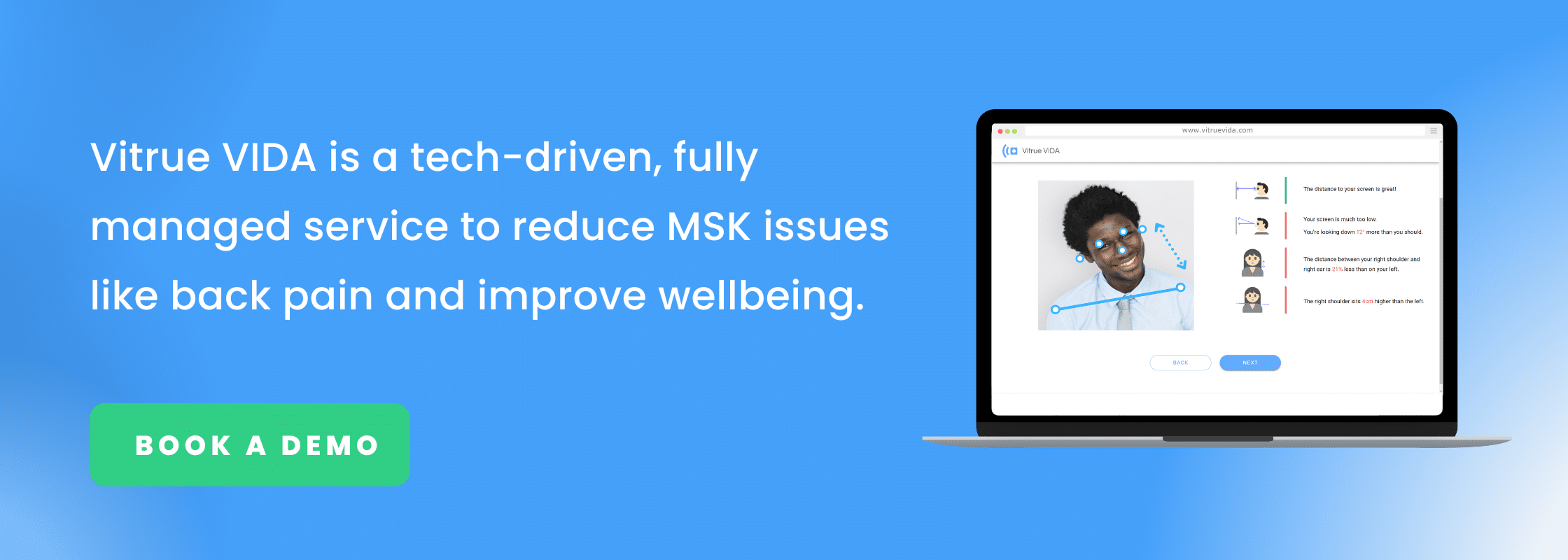89% of HR leaders believe artificial intelligence (AI) will play a key role in the success of workplace health strategies by 2030. 70% of companies have already jumped on the bandwagon and put AI plans and protocols in place. As AI makes waves across the workplace, it’s crucial for companies to understand its potential impact on employee physical health and wellbeing.
Musculoskeletal (MSK) issues like back pain, arthritis and repetitive strain injuries affect 62% of desk workers and 75% of employees who drive. Every individual has unique risk factors for developing pain, including their ergonomics, posture, habits and personal factors like genetics and lifestyle. There’s no one-size fits all approach to MSK health and employers need tailored solutions to effectively tackle workplace pain. AI has the potential to reshape workplace physical health by predicting and preventing MSK health issues in ways we’ve never seen before.
Did you know? Deloitte’s most recent Wellbeing at Work survey revealed that most employees feel their physical health worsened or stayed the same in the last year.

The biggest AI trends in workplace physical health
With the right AI tools and technologies, employers can address the unique complexities of workplace pain and make a huge difference to employee wellbeing. Here are some of the biggest AI developments in workplace physical health:
1. Conversational AI for tailored employee support
One of the most exciting developments in workplace health is the rise of conversational AI to provide real-time support for employees experiencing pain. AI uses natural language processing (NLP), so your team can have advanced human-like conversations about their health and wellbeing. Instead of waiting days to see a physio, employees get immediate advice on the right stretches and ergonomic adjustments to manage their pain. In more serious cases, employees will be recommended to take further steps such as making an appointment with a specialist.
2. Data-driven predictive capabilities
AI’s predictive capabilities are a game-changer for workplace pain reduction. By analysing large datasets, AI can spot potential MSK health risks before they escalate. For example, if employee data shows a high rate of pain in a particular department, employers can act swiftly and offer tailored support for their specific needs. With AI solutions, HR leaders can gain invaluable insights into health and wellbeing at their company.
3. Personalised clinical support
AI can process extensive health data to provide highly personalised clinical support, tailored to individual employees’ needs and health profiles. AI-driven solutions that go beyond physical symptoms and consider factors like personal habits, lifestyle choices and working habits, provide the most comprehensive support for reducing employee pain.
Top concerns around using AI in workplace health
Despite all its potential benefits, HR leaders foresee several hurdles in the widespread adoption of AI in workplace health. A recent study by Unmind reveals that 42% of companies worry that AI lacks the required empathy and human touch to support their employees. 39% question the ethics of AI making decisions in workplace health and 37% have privacy and data security concerns.
It’s crucial for companies to balance AI adoption with human support, ethical considerations and robust data security measures, to provide the best physical health support for employees.
How VIDA’s AI-powered MSK Copilot can help
VIDA’s MSK Copilot, powered by OpenAI, is a clinically validated AI solution to address, manage and eliminate MSK health risks in your company. It uses AI to identify company-wide MSK health trends and provide valuable insights to improve workplace physical health. Combined with Vitrue’s data from users across the world, VIDA MSK Copilot generates highly personalised, conversational responses to your questions around MSK health in your company – all within seconds.
VIDA MSK Copilot is powered by a combination of Vitrue algorithms and the latest LLM models from OpenAI. However, no personally identifiable data is ever shared with OpenAI. We take data privacy seriously and ensure that all data is handled securely and in compliance with relevant regulations.
Whether it’s reducing risks for individuals in your team, supporting overall employee health, or managing company-wide MSK risk, our AI-driven solutions are here to help you reshape physical health at your company.

At Vitrue Health, we’re on a mission to reduce musculoskeletal pain for millions of people. For more information on how VIDA’s AI solutions can help you reduce pain in your team, get in touch with us at sales@vitruehealth.com or book a demo today!





